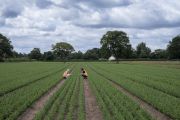More UK trees needed to hit climate targets
The Government’s climate change and biodiversity targets will not be met without greater support for domestic tree production, according to a groundbreaking new report produced jointly by the Woodland Trust, the Horticultural Trades Association (HTA), the National Trust (NT) and the Royal Horticultural Society (RHS).
The Strong Roots report, published today (Tuesday 14 October 2025) and launched at a joint press event at RHS Wisley, suggests that the UK government’s Net Zero Strategy, which requires 40,000 hectares of trees to be planted annually by 2030, is likely to be held back by barriers to domestic tree production, such as the lack of a designated action plan and a shortage of skilled workers.
The report stresses the essential role trees play in sustaining biodiversity, mitigating climate change and enhancing wellbeing, and makes recommendations to the Government on how to increase availability of homegrown trees across England, Scotland and Wales.
In particular the report highlights the importance of:
- Economic Growth and Jobs: The tree production and management sector supports over 22,000 jobs and contributes an estimated £5.02 billion annually. Further support could enable growth of 45%, creating an additional 9,900 jobs, many in rural areas.
- Environmental Targets: A robust domestic sector is essential to meet commitments, including the UK Government's target to ramp up tree planting to 40,000 hectares annually by 2030.
- Market Stability: Market uncertainty remains the biggest challenge for 93% of nurseries surveyed, often relating to inconsistent government planting grants.
Strategic support needed
In 2023/24, Britain planted over 20,000 hectares of new woodland, the highest in 35 years, yet meeting future planting targets will require strategic support for domestic tree production, which is “the backbone of reaching targets to increase tree cover” according to the report
Recommendations include an action plan for British tree production, increased support for British tree growers and more diversity in trees being produced within the UK.
Increasing domestic tree production will improve biosecurity by reducing the need for imports, which can bring with them an increased risk of tree pests and disease. Managing pests and disease is estimated to cost the UK economy £6.1 million a year. As well as reducing the bill for biosecurity, increasing domestic tree production has benefits for the UK economy, according to the report. In 2023, Britain imported £280 million-worth of trees and shrubs.
Another issue highlighted is the low number of fruit, nut and amenity trees being produced domestically in Britain. These trees play fundamental roles in agroforestry, as well as in city streets and gardens.
The need for coordination
Rebecca Gosling, Lead Policy Advocate at the Woodland Trust said: “All three British governments have ambitious annual targets to increase tree cover. England’s Environmental Improvement Plan sets a legally binding goal of expanding tree cover from 14.5% to 16.5% by 2050. This level of tree planting, which is vital in the fight against climate change, simply won’t be possible unless there is coordinated support for the British tree production industry.
“We want to see the Government address this with an action plan for British tree production.”
Sally Cullimore, Technical and Trade Policy Manager at the Horticultural Trades Association, said: “The Strong Roots report is the result of a strong and unique collaboration, shaped by the expertise of HTA members in UK tree production.
“The UK tree sector is a key part of environmental horticulture, which presents a real opportunity for governments across all British nations to commit to genuine green growth – growth literally rooted in the hands of UK tree producers…. . it is critical that the government and policymakers recognise that trees cannot be grown overnight “
“Tree producers are part of a sector that contributes £38 billion to the UK economy. Swift and consistent action on the expert recommendations in this report will be vital to supporting the businesses that grow the trees our landscapes, communities, environment, and economy need for the future.”
The National Trust’s Head of Trees and Woodland, John Deakin, said: "The National Trust is playing its part with ambitious plans to establish 20 million new trees by 2030 for the benefit of people, climate and nature. But for us and others to achieve such goals, it is crucial that there is Government investment in and support for reliable, sustainable and biosecure tree production in the UK”.
Real benefits to planting British trees
In summary, Professor Alistair Griffiths, RHS Director of Science and Collections, said: "The benefits of investing in domestic tree production in the UK are clear, both economically and in building climate resilience.
“By growing more trees locally, we can better support national efforts - including those of the nation’s gardeners - to adapt to and mitigate climate change while also creating skilled jobs and boosting innovation across the horticultural and forestry sectors. This report shows that targeted investment, research and innovation are essential to unlocking the full potential of British tree production.”
A full copy of the report is available at https://hta.org.uk/strong-roots after 2pm.


.jpg)
.jpg)
.jpg)